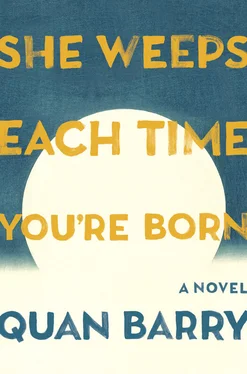They were almost to Nam Xoi. Tu said there was a small gatehouse on each side of the Laotian border with a soldier in it, and they wouldn’t need any paperwork. The soldier would simply check to make sure they weren’t smuggling any illegal timber from the old forests, that there were no small logs tied to the car’s undercarriage.
In the east the sky was a soft pink. In the backseat Qui sat bright as the moon. When they saw each other for the first time, she and Tu had simply bowed to one another before hurrying together up the stairs to gather Linh from her bed and carry her down to the car. My contact is waiting for us in Vientiane, Tu had said breathlessly as if there were nothing else to explain. I don’t know how long he’ll wait. Qui’s face remained smooth and untroubled, as if she’d always known that one day he would arrive on their doorstep and whisk them away.
The first hour on the road he told them everything about his years in a relocation camp on the Bataan Peninsula and how the Philippine government was in the process of closing the camp and sending the refugees home, repatriating people in, of all places, Cambodia, where the new cease-fire was holding.
Through the years he had moved all throughout Asia. Always east. After the boat hit the mine, he and some of the others had drifted on the wreckage to an island where the people robbed them before calling the authorities. He spent the first four years in a UN refugee camp in Thailand, then another three in Malaysia before being moved to Morong. I thought you were dead, he said. He looked over at Rabbit and tried to smile. An, Phuong, and Sang went straight from Thailand to the U.S. because An had a cousin in Orange County, he said. In the early morning light Rabbit could see what the effort to smile was costing him. Me, I’m former Vietcong, he said. The Americans will never let me in.
Rabbit could sense Qui in the backseat hanging on Tu’s every word. Qui was even more beautiful than the night she had taken Tu in her arms on the floor of the floating house in Ba Nuoc. Behind the wheel Tu looked straight out the window, but somehow his eyes weren’t on the road. For the moment the rising sun and the setting moon were both in the sky at once. There were thousands of people in the camps waiting for a slip of paper, Tu whispered, the birthmark on the edge of his hair shining like a ruby. Almost twenty years, half my life. He glanced at Rabbit. I still get letters from An in California. He sends money. Tu took a deep breath. All these years so many of us trying to get out of Vietnam, he said. An says the American people don’t even know.
With Tu just an arm’s length away, Rabbit didn’t need to ask what had happened to the others. If she closed her eyes and let herself drift off into the light, her ears softly throbbing, she could see Hai floating in the water with one of his legs blown off. Phuong screaming uncontrollably. The doctor’s wife and the little girl slipping under the surface without a sound, the wife still working her necklace of beads. Pieces of the boat burning in the fog. In the vision Rabbit couldn’t see Duc anywhere. Just the boat’s steering wheel floating on the ocean, Arun’s body drifting nearby, a smile fixed on his face. Three of the Cambodians were still alive and trying to lash together large pieces of wreckage. Rabbit scanned the vision for Huyen, but she knew that was how the old woman would have wanted it. The instant erasure. No fuss.
Then the days dragging on for those left living. The sun burning them all until their skin bubbled. Phuong and Sang clinging to each other. Phuong moaning I want to die and Sang holding tighter to her mother all the while in the rags of her red ao dai . An with a look of madness, grieving for his lost son. None of the remaining Cambodians able to speak Vietnamese. Everyone growing quiet and quieter. Qui and I spent a year in a reeducation camp, said Rabbit. Did it work, said Tu lightly. Were you reeducated? Rabbit snickered. We spent the year weaving baskets.
Then Rabbit had a vision of Tu’s life in the camps. She saw an endless series of threadbare tents like a maze, the smell of human excrement burning in metal drums, the clamor of ten thousand people living in a few acres. During the day some of the men were let out to try and find work. Some of the local people cheated them. Some of the local people were generous. There were two faces Rabbit didn’t recognize, a woman with the trademark pink cheeks of someone from the mountains of Sapa, the capillaries in her skin broken from years of living at ten thousand feet above sea level. A girl stood by the woman with the same thick smile as Tu. There was something else about the girl’s face, an intensity in the eyes, a smattering of freckles. They were carried away by one of the epidemics, said Tu, as if sensing her vision. There were epidemics all the time. His voice was calm, but Rabbit could tell it was hard-earned. Thuy was my wife for eight years. Rabbit glanced in the rearview, but Qui’s marble-white face was inscrutable as ever. Tu continued. Chi was six when they both died.
In the backseat Linh opened her eyes. They were only a few minutes from the border. Are we home yet, she said sleepily. Qui put her arm around her. The front of Qui’s shirt was strangely dry considering she hadn’t had time to nurse an orphaned baby. All they had brought with them was the pale blue rice bowl and the sack of bones.
From the backseat the male parakeet began to flap his wings. Lady. There was an urgency in his voice. Lady, I have something to tell you. Rabbit hadn’t wanted to bring them along, but Qui had insisted in her own silent way. Rabbit remembered being a little girl and watching Binh grow smaller as Huyen paddled away to the floating market to trade the bird for the red ao dai . Okay, Rabbit had said. The birds can come.
The parakeet fluttered into the front seat and landed on Rabbit’s shoulder. Lady, he said. I may never have the chance to speak with you again. The scent of lemon was almost gone from his wings. Hush, said Rabbit, not here. What, said Tu. The border was just up the road. What’s not here, Tu said.
Most of what little traffic there was was coming from the other side into Vietnam. People herded animals and carried goods to sell in Nam Xoi. A few pulled carts loaded with produce. Occasionally the guard would stop one of the large carts and poke around. A few battered trucks were driving into Laos. The guard waved each truck through without stopping them.
When their turn came, Tu rolled down the window. Over the sound of a passing truck Rabbit didn’t hear what Tu said, but she saw him slip some bills into the guard’s hand. For a moment the guard turned and walked away openly counting the money. He stopped and came back a second time. Rabbit heard the guard ask something about the parakeets. If they were the endangered red-breasted variety. They’re green, Linh said, her dimples blazing full force. Her charm didn’t faze the guard. Maybe they’re females, he said. Only the males of that species are red. Brother, I never thought of it that way, said Tu, handing the guard some more money. But they talk just like people, said Linh. Say something, said the guard to the male bird. Xin chao , said the bird. Xin chao , said the guard, and waved them through.
Nobody was standing in the gatehouse on the Laotian side. Tu breathed a sigh of relief. He hadn’t budgeted for a third bribe.
Looking back to the Vietnamese side Rabbit could see a small figure standing all alone by the guardhouse. Even from where she sat on her way into another country, she could see the scratch running the length of his face.
Twenty minutes later they got out of the car to stretch and get their bearings. The landscape was otherworldly. Towering green hills shot dramatically up out of the ground, a dragon’s back undulating out of the earth, the road winding among the limestone karsts. Rabbit reached out and took the male parakeet off Linh’s shoulder. She walked a little ways up the road. What is it, she said. The bird looked at her with its black eyes. There was no understanding in its face. Xin chao , it said. Xin chao. Xin chao . Then it began cawing.
Читать дальше












